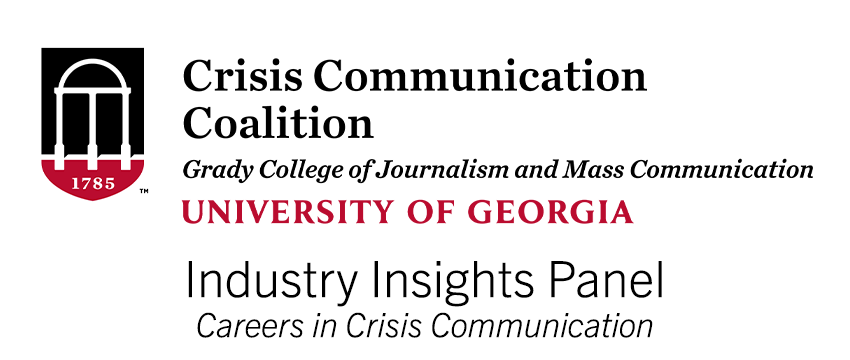Industry Insights: Careers in Crisis Communication

Industry Insights: Careers in Crisis Communication
This article was submitted by the Crisis Communication Coalition at UGA. You can learn more about it at: https://grady.uga.edu/crisis-communication-coalition/
The University of Georgia Crisis Communication Coalition hosted the Industry Insights: Careers in Crisis Communication webinar featuring Michael Gray (ABJ ’11), GE senior communications business partner and Grady Society Alumni Board member, Leah Seay, issues management spokesperson at Amazon, and Maria Stagliano (AB ’19), account executive at LEVICK. Samantha Meyer (ABJ” 13, MA ’14), director of experiential programs at Grady College, served as moderator on March 23, 2021. Students and faculty alike learned about current crisis communication trends, tips on how to break into the crisis industry, and ways to excel at your crisis communication career. Here are some of the key takeaways from our event.
- Crises will follow you anywhere in any career.
No matter what communications route you end up going down, crises will follow. There is the inevitability of dealing with difficult issues that may not have initially come written in your job scope. While it may seem daunting, being able to experience crisis first-hand might lead into an unexpected career in crisis communication.
- You can’t go wrong by choosing agency or in-house/corporate.
The panelists for this event came from a wide range of differing backgrounds and career experiences. Each had their own take on what route a recent graduate should take. Gray and Stagliano noted they had a lot of experience writing in different brand voices and working with numerous clients that they enjoyed in agency life. Seay, on the other hand, enjoyed going corporate because she worked in a rotating program working at different parts of the business when she was hired at her first full-time career. All three panelists highlight the importance of figuring out your goals first, then crafting your job search around those goals.
- Develop skills now that can help you later.
There are a few skills students can acquire now that will set them up for success while working in communications – especially in crisis. The three panelists stated that having strong written communication skills is absolutely necessary when working in crisis communication. Seay added that learning about media relations in class or in an internship has helped her advance her career. Gray recommended students to learn about how to effectively handle high-stress or crucial conversations with bosses and peers.
- Consider your lifestyle when choosing a career.
Whether you are more fast-paced or go-with-the-flow, there is a communications career path for you. Certain careers, like in global corporations or crisis firms, tend to appeal to people who prefer a high stress lifestyle. Smaller agencies or businesses might lend a more laxed work environment. When researching for job positions, consider the post-graduation life you want to live and focus on opportunities that compliment your lifestyle in a realistic way.
- Become familiar with current events – especially crises.
Staying up to date with the news is vital in having a successful career in crisis communication. Stagliano recommended students to be aware of current events and trends nationally and globally in order to stay on top of potential and emerging crises in your industry.
- Treasure your work-life balance.
With the pandemic showing us the importance of self-care, all three panelists noted that having a healthy work-life balance is key in having a positive attitude in the workplace. They recommend allotting a certain time each day to take to yourself, whether it’s to stretch, go on a walk, or workout.
Watch the entire webinar here and subscribe to the College’s YouTube channel.
Follow the Crisis Communication Coalition for more crisis communication insights and upcoming events.